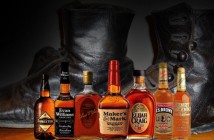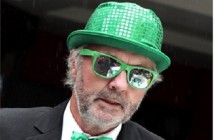Although fans and song pluggers consider “Poncho & Lefty” one of American music’s most famous buddy songs—full with rugged individualism and the spirit of the open road—the tune just might be the story of one lonely man with a split personality and a man child soul that never made it to the Promised Land. Nobody really knows.
Covered by Emmy Lou, Willie and Merle, Waylon and other country music glitterati, “Poncho & Lefty” is an existential song poem—offering up themes like drugs, money and betrayal—conjured up by Texas songwriter and cult hero Townes Van Zandt. When Willie and Merle used it as the title song for their CD in 1986, it went gold and made Van Zandt an iconic hero for the outlaw country crowd, way beyond the rough trade joints in Texas that he sometimes played for a pittance.
A troubled soul with a clinical diagnosis of manic depression who hailed from one of the founding families of the Republic of Texas, Townes wrote Poncho & Lefty in 1972. Being from a pioneer family didn’t keep him from drifting into the outlaw lifestyle due to his well-publicized addiction to heroin, and alcoholism, demons that haunted his soul for much of his adult life.
A decade earlier at the age of 18, in 1962, Townes was submitted to three months of insulin shock therapy at the University of Texas Medical Branch in Galveston. Much of his memory was destroyed by the treatment, which put people into insulin induced coma and was at the time being discredited by psychiatrists in medical and psychiatric journals in the United States and Great Britain. His WikiPedia bio entry notes that his mother’s biggest regret in life was “allowing that treatment to occur.”
He kept it together just enough to write songs and live on the edge. You could already sense the fatalistic strain in his 1967 classic, “Waitin’Round To Die.” His genius recognized, Townes recorded in Nashville with a producer close to Sam Phillips. It was there that the social graph of Townes Van Zandt crossed paths with another son of Texas, Kris Kristofferson. And the dots on the graph continue to connect even today.
Ironically, Kristofferson, born in 1938, was everything Townes could have been had he not been dealt the wrong hand and used the wrong stuff. Kristofferson, whose daddy was an Army major general, had those extroverted “hot dog” qualities that author Tom Wolfe said gave smarty pants flyboys the right stuff. He was already angling for an acting career, attending Pomona College in 1958 and moved on to a Rhodes scholarship. Clint Eastwood and Randall Patrick McMurphy (Jack Nicholson) were trying to make it in Hollywood at the very same time.
While all American West Point halfback Pete Dawkins was winning the Heisman Trophy and making the cover ofSports Illustrated the future co-author of “Me and Bobby McGhee” was cited by SI editors as a young athlete to watch.
Townes was just fourteen and what little childhood memories that weren’t burned out by insulin shock therapy indicate that he liked Elvis Presley’s music and the big cars he drove.
Kristofferson became a quintessential Yank at Oxford like Dawkins and an Army officer like his dad. He did a tour as a chopper pilot with the 8th Infantry Division in West Germany but a career in music and show business was still on his mind. But instead of being a poster boy for Viet Nam like Dawkins he spurned a prestigious teaching assignment at West Point and was disowned by his family. He worked as a chopper pilot on oil platforms off the coast of Louisiana and stints in Nashville, hoping to break into the Nashville scene which Van Zandt resented and rebelled against.
It was country crooner Roger Miller, who made “Dang Me” a hit who took a Nashville version of “Bobby Gee” to the 12th spot on the national country charts that year. But the tune wouldn’t become a rock world cult hit until Kristofferson’s sometime girlfriend Janis Joplin, recorded it on the eve of her death in 1971. Van Zandt penned “Pancho” the following year.
Both Van Zandt and Kristofferson were mentored by legendary Texas songwriter-performer Mickey Newbery, considered the godfather of the Texas outlaw movement. Newbury placed “Bobby McGee” with Roger Miller and convinced Van Zandt to move to Nashville.
Shortly before his death in 2002 Newbury gave an interview to writer John Kruth, who was researching a biography of Van Zandt. “How many people have listened to my songs and thought, ‘He must have a bottle of whiskey in one hand and a pistol in the other’. Well, I don’t. I write my sadness.” That’s what Townes was all about.
Townes Van Zandt, known for telling tall tales, offered music media and friends different versions about the meaning of the story line in the lyrics to “Poncho and Lefty.” He also claimed he didn’t really write the song or know the meaning because it was spontaneous and that the song “just passed through me.”
Whatever it passed through, it’s legend now. And it is a contagious one that sells records. The 1983 Willie and Merle version suggests a dope deal gone bad. Mexican Federales. Outlaw buddies. one ratting out the other in a tale that spins from the hot dust of the Mexican desert to the cold sleaze of a skid row hotel in Cleveland, Ohio. Or as Van Zandt wrote… “or so the story ends, we’re told.”
When he sang “Poncho & Lefty” at the Obama White House last year with Darius Rucker, the made over Kris, age 74, still the quintessential Texas showman with the right stuff, offered no clues.
In Townes’ 1993 version of “Poncho,” he is cleaned up and lucid. Hear the song of a poet, not a showman like Kristofferson.



